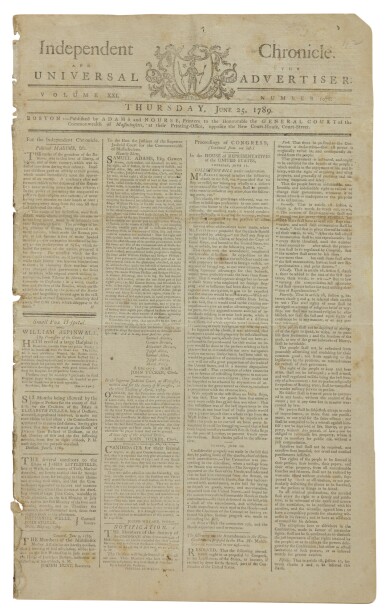Fine Books and Manuscripts including Property from the Eric C. Caren Collection
Fine Books and Manuscripts including Property from the Eric C. Caren Collection

Property from the Eric C. Caren Collection
MADISON, JAMES | James Madison’s proposed Bill of Rights in the Independent Chronicle and the Universal Advertiser. Vol. XX1, No. 1078. Boston: Printed by Adams and Nourse, Thursday, June 25, 1789
Lot Closed
July 21, 05:12 PM GMT
Estimate
5,000 - 7,000 USD
Lot Details
Description
Property from the Eric C. Caren Collection
MADISON, JAMES
James Madison’s proposed Bill of Rights in the Independent Chronicle and the Universal Advertiser. Vol. XX1, No. 1078. Boston: Printed by Adams and Nourse, Thursday, June 25, 1789
Folio, 4 pages (19 1/8 x 11 7/8 in.; 490 x 300 mm), allegorical woodcut printer's device in masthead, two woodcut vignettes of buildings among the advertisements, text in four columns; a little staining and spotting, disbound. The consignor has independently obtained a letter of authenticity from PSA that will accompany the lot.
The birth of the Bill of Rights: James Madison's proposed amendments to the Constitution.
On June 8, 1789, James Madison introduced a proposed Bill of Rights to the Constitution during an address to the House of Representatives. After three months of debate and many revisions, the House adopted a Bill of Rights that featured seventeen amendments. The Senate reworked the proposal into twelve amendments, ten of which were approved by the states and adopted as the Bill of Rights in December 1791.
But despite the inevitable revisions that took place during the legislative process, the influence of Madison’s first proposals runs throughout the Bill of Rights as adopted. Among his proposed amendments, published on the first and second pages of this issue of the Independent Chronicle, were the following familiar guarantees:
"The civil rights of none shall be abridged on account of religious belief or worship, nor shall any national religion be established, nor shall the full and equal rights of conscience be in any manner, or on any pretext infringed."
"The people shall not be deprived or abridged of their right to speak, to write, or to publish their sentiments; and the freedom of the press, as one of the great bulwarks of liberty, shall be inviolable."
"The people shall not be restrained from peaceably assembling and consulting for their common good; nor from applying to the legislature by petitions, or remonstrances for redress of their grievances."
"The right of the people to keep and bear arms shall not be infringed; a well armed, and well regulated militia being the best security of a free country: but no person religiously scrupulous of bearing arms, shall be compelled to render military service in person."
"Excessive bail shall not be required, nor excessive fines imposed, nor cruel and unusual punishments inflicted."
"The rights of the people to be secured in their persons, their houses, their papers, and their other property from all unreasonable searches and seizures, shall not be violated by warrants issued without probable cause, supported by oath or affirmation, or not particularly describing the places to be searched, or the persons or things to be seized."
"In all criminal prosecutions, the accused shall enjoy the right to a speedy and public trial, to be informed of the cause and nature of the accusation, to be confronted with his accusers, and the witnesses against him; to have a compulsory process for obtaining witnesses in his favor; and to have the assistance of counsel for his defence."
"The powers not delegated by this Constitution, nor prohibited by it to the State[s], are reserved to the States, respectively."
Madison made two suggestions that were not adopted. First, he wanted to prefix an introduction to the preamble, which would have moved the declaration"We the People," from its place of primacy. Second, he wanted the amendments incorporated into the text of the Constitution, rather than being appended at the end. There is little doubt, though, that without Madison's proposed amendments to the Constitution, the Bill of Rights as we know it would not have been adopted.
